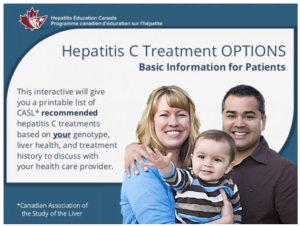 General Hep C Treatment Information
General Hep C Treatment Information
The hepatitis C virus (HCV) spreads through blood by infecting cells and then using those cells to create new copies of itself that then infect other cells. Therefore, the goal of hep C treatment is to stop this replication to such an extent that a person’s HCV viral load, the amount of virus within their blood, is undetectable six months after completing treatment. When this happens, it is called achieving a sustained viral response, or SVR. When SVR is achieved, the virus can no longer be detected in the blood and it is very unlikely that the virus will come back/the viral load will increase/the patient will relapse. When SVR is achieved, the virus can’t be spread to others and liver disease from hep C is halted.
Hepatitis C Virus Genotypes and their Importance to Hep C Treatment
The hep C virus has different forms or genetic structures, called genotypes. The most common hep C virus genotype in North America is genotype 1, but 2 – 6 are also present.
Knowing about hep C virus genotypes is important as they impact what treatments will give someone the best chance of curing their hep C. For example, until recently, only about 50% of those treated for hepatitis C genotype 1 were cured, or achieved a sustained viral response, while people with hep C genotype 2 and 3 viruses achieved better results.
Direct-Acting Antivirals (DAAs)
But regardless of genotype, also until recently, many of those with hepatitis C had to stop treatment because of severe side effects from interferon (IFN) or pegylated interferon with ribavirin (PR), the standard of care for over a decade.
Fortunately, the advent of new hepatitis C treatment drugs called direct-acting antivirals (DAAs), treatments that directly target the hep C virus in different ways to stop it from making copies of itself, as come. With shorter treatment times, higher cure rates, fewer side effects, and interferon-and-ribavirin-free regimes, DAAs promise a much brighter future for people living with hepatitis C.
Please note, there are four different types of DAAs. An amazing table that explains these four types of DAAs and what they all do within hepatitis C treatments can be found on our The Four Classes of Hep C Treatment DAAs page.
First Generation DAA Treatments
Incivek (telaprevir) and Victrelis (boceprevir) were first generation DAAs. They were both taken with interferon or pegylated interferon with ribavirin. Although their cure rates were higher than interferon and/or ribavirin alone, their side effects were difficult and forced some to stop treatment due to their severity. As a result, Incivek was discontinued in December 2014 and Victrelis was discontinued in March 2016.
Current DAA Treatments
In 2014, second generation DAAs, which make up current hepatitis C treatments, started being approved for use in Canada. These DAAs are commonly combined with each other to create hep C treatment regimes that, although they may still require pegylated interferon or ribavirin for their best chance of success, have shorter treatment times (8 – 24 weeks), much higher cure rates, and fewer and far less severe side effects.
The following tables very briefly introduce these DAA treatments:
Canadian Approved DAA Treatments
| All DAA Treatments Approved in Canada* |
Targeted Hep C Genotype |
| Daklinza (daclatasvir) + Sovaldi (sofosbuvir) | 1-3 |
| Epclusa (sofosbuvir / velpatasvir) | 1-6 |
| Galexos (simeprevir) | 1 |
| Galexos (simeprevir) + Sovaldi (sofosbuvir) | 1 |
| Harvoni (ledipasvir / sofosbuvir) | 1 |
| Holkira Pak (ombitasvir / paritaprevir / ritonavir + dasabuvir) | 1 |
| Sovaldi (sofosbuvir) | 1-4 |
| Sunvepra (asunaprevir) + Daklinza (daclatasvir) | 1, 4 |
| Technivie (ombitasvir / paritaprevir / ritonavir) | 4 |
| Zepatier (elbasvir / grazoprevir) | 1, 3, 4 |
| *These DAA treatments are approved for use in Canada, but may or may not be covered by BC PharmaCare or other Canadian programs that help residents with the cost of prescription drugs. | |
BC PharmaCare Covered DAA Treatments
| Treatment | Targeted Hep C Genotype |
| Galexos (simeprevir) | 1 |
| Harvoni (ledipasvir / sofosbuvir) | 1 |
| Holkira Pak (ombitasvir / paritaprevir / ritonavir + dasabuvir) | 1 |
| Sovaldi (sofosbuvir) | 1-3 |
A comparison of these treatments can be found at Comparing the Hep C Treatments.
Other Hep C Treatments Covered by BC PharmaCare
Hep C Treatments with Possible Pegylated Interferon and/or Ribavirin Free Options
| Treatment | Targeted Hep C Genotype |
| Daklinza (daclatasvir) + Sovaldi (sofosbuvir) | 1-3 |
| Epclusa (sofosbuvir / velpatasvir) | 1-6 |
| Harvoni (ledipasvir / sofosbuvir) | 1 |
| Holkira Pak (ombitasvir / paritaprevir / ritonavir + dasabuvir) | 1b |
| Sunvepra (asunaprevir) | 1, 4 |
| Zepatier (elbasvir / grazoprevir) | 1, 3, 4 |
The Next Generation Direct-Acting Antivirals (DAAs)
Our Next Generation Treatments page is dedicated to the hepatitis C treatments that are coming. These treatments are currently still within the early stages of clinical trials and may or may not be successfully approved for use and, if they are approved, may take a number of years to do so.
Further Treatment Links and Resources
Hepatitis C Treatment OPTIONS: Basic Information for Patients by Hepatitis Education Canada
This interactive tool will provide you with personal hepatitis C treatment recommendations that can be printed for reference or to taken your provider. (Canadian)
CADTH’s Hepatitis C Treatment Resources
This is a list of links to CADTH’s hep C treatment resources, including all of their treatment recommendations. (Canadian)
CATIE: Getting to know HCV Proteins and Drugs
CATIE’s webpage provides a detailed explanation of new DAAs and how they fight the hep C virus. However, please note the 2013 date of this page. Some of the treatments discussed are no longer in development. (Canadian)
The Canadian Association for the Study of the Liver’s Update on the management of chronic hepatitis C: Consensus guidelines from the Canadian Association for the Study of the Liver
While technical, is an excellent source for anyone wanting to dig into current recommendations for hepatitis C management and treatment from Canadian experts. (Canadian)
Hepatitis C New Drug Research & Liver Health
Their mission is to keep you current on the potential arrival of new improved drugs to treat HCV. Information is gathered from peer reviewed literature, recent conferences, news articles, and editorials. Visitors can take advantage of links to educational resources, as well as research articles on both liver health and viral hepatitis. (American)
Hep Magazine
This resource contains a clear description of all hepatitis C treatment drugs and links to news articles about them. (American)
Treatment Action Group’s HCV Drug Pipeline Report
This site reports on the latest HCV developments, studies, and conferences. (American)
Further Hep C Treatment Links and Resources
- Hepatitis Education Canada’s video ‘What is the treatment for hepatitis C?’ (Canadian)
- CIHR Canadian HIV Trials Network Coinfection and Concurrent Diseases Core Research Group: 2016 Updated Canadian HIV/Hepatitis C Adult Guidelines for Management and Treatment (Canadian)
- The American Journal of Medicine (AJM)’s Hepatitis C Resource Center (American)
- 2016 HCV Guidance: Recommendations for Testing, Managing, and Treating Hepatitis C by the American Association for the Study of Liver Diseases (American)
- Links to detailed drug information by the American Association for the Study of Liver Diseases (American)
- New HCV treatment drug/combination information by Clinical Care Options (American)
- Guide on Hepatitis C for Journalists by the World Federation of Science Journalists
Contact us at [email protected]
The information on this website is meant as a resource only and is not intended to replace qualified medical attention. Please seek advise and guidance from your health practitioners when considering your hep C treatment options.

